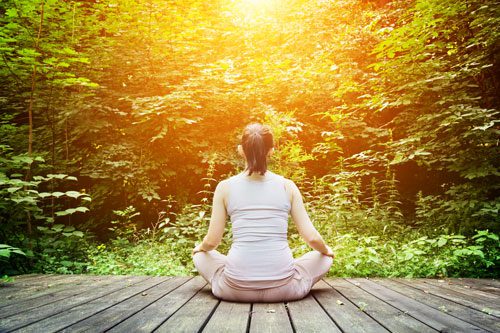 It doesn’t matter if you’re going through rehabilitation or not: spending time in the great outdoors is good for your health.
It doesn’t matter if you’re going through rehabilitation or not: spending time in the great outdoors is good for your health.
There are many reasons for this.
Reap the Benefits of Being Outside
You’ve probably heard all this before—being in nature makes you feel better. Biologically, we’re designed to move, play, and be active. But this modern age filled with electronic devices forces a more sedentary lifestyle indoors. Nature deficit disorder, while not a medically-recognized condition, is a term to describe a disconnect with the world around us. The more we’re removed from nature, we’re more prone to a lessened ability to concentrate, negative moods, and decreased wellbeing.
Fortunately, it’s easy to turn this around. Step outside and watch the birds. Plant a container garden. Stroll through a new park. You don’t have to climb mountains or kayak in the ocean—unless you want to, of course! Even a minimum of five minutes outside each day provides you with a necessary boost. One part illness prevention plus one part positive physiological responses equals many improvements.
Nature is an automatic stress reliever.
One of the easiest ways for many people to feel calm is to be outdoors. In medical studies, both teens and adults experienced reduced cortisol—the stress hormone—when in a natural setting compared to traveling city streets. More importantly, cortisol levels stayed low for many days after an extended period outdoors.
Why does this happen? A part of our brain, the amygdala, helps us experience emotions. In a bustling city atmosphere, the amygdala heightens our anxiety in anticipation of threats, especially those out of our control. For most people, nature doesn’t prompt the amygdala to elevate its response. In this environment, we have less external stimulation to force sensory reactions. Your mind can rest, which lowers cortisol and blood pressure.
Nature promotes healing.
From reducing chronic pain to post-surgical recovery, the medical community now recognizes that integration with the natural world activates the body’s autonomic nervous system. A calmer patient is more hopeful, less stressed, and creates space to let the body work as it should to heal.
Again, it only takes a few minutes looking at water, flowers, or trees—even as pictures or paintings—for an individual to feel soothed, which stimulates the immune system and furthers the effects of treatment applications.
Considered a non-invasive form of care, nature programs are in place in medical centers throughout the United States. One example is the Green Road wild garden at the Walter Reed National Military Center to help people with PTSD. Created by physician Frederick Foote, his studies of the project indicate recovering patients experience less depression and reduced anxiety and stress.
Another example of healthcare-led nature healing is in Georgia at Northside Hospital Cherokee in Canton. When building a new facility recently, developers planted 3,700 trees around the building and installed large windows in patients’ rooms to allow them unobstructed views of the Blue Ridge Mountains. Even the new interior artwork is nature-themed—featuring farms, lakes, summits, and trails.
Nature reduces brooding.
Rumination is the official term for when you can’t stop replaying negative thoughts, pondering over past conversations, or reimagining how things “could have been.” Rumination is toxic behavior that deepens depression, hampers motivation, and triggers stress.
Being outside, even for a short walk, stops this literal train of thought. Researchers believe this is due natural surroundings improving activity in the prefrontal cortex—which makes up more than 10 percent of your brain. It’s responsible for executive functions such as problem-solving, making decisions, and planning. Instead of traveling the same path repeatedly, newfound clarity puts an end to brooding, which helps reduce depression.
Nature opens your mind to possibilities.
People in addiction rehab often feel their future is uncertain, and don’t know their place. Nature provides a different worldview that doesn’t exist when we’re so focused on our issues. What we often lack in our daily lives is a sense of wonder.
For example, if you were to sit quietly and watch a Monarch butterfly on a flower for a few minutes, you might also contemplate how its delicate wings enable it to travel thousands of miles. Even though it risks predatory birds, extreme weather conditions, and decreasing habitat, it perseveres. How does this one moment with a butterfly allow you to find meaning in your life?
This simple introspection can be rather mind-blowing, and help you develop a whole new perspective.
Preliminary studies of being filled with awe due to nature indicate it reduces inflammation. In addition, some people report being happier because of what they experience outside and how that relates to other aspects of their lives. This, in turn, helps improve connections with other people, and inspire more community engagement.
From the Japanese zen trend of Shirin-Yoku—also known as forest bathing—to the practice of foraging for free food, there’s no limit to what you can do outdoors. Start in your backyard, at a nearby park, by a trickling stream, or take a look around Georgia and see if its natural wonders inspire you to explore a new way of being.
The Inviting Beauty of Twin Lakes
The tranquil setting of Twin Lakes Recovery Center offers multiple scenic acres of forests and water features that create a haven of wellness. You can enjoy a number of outdoor activities, or simply be one with nature, restoring your soul during a quiet walk through the trees.



